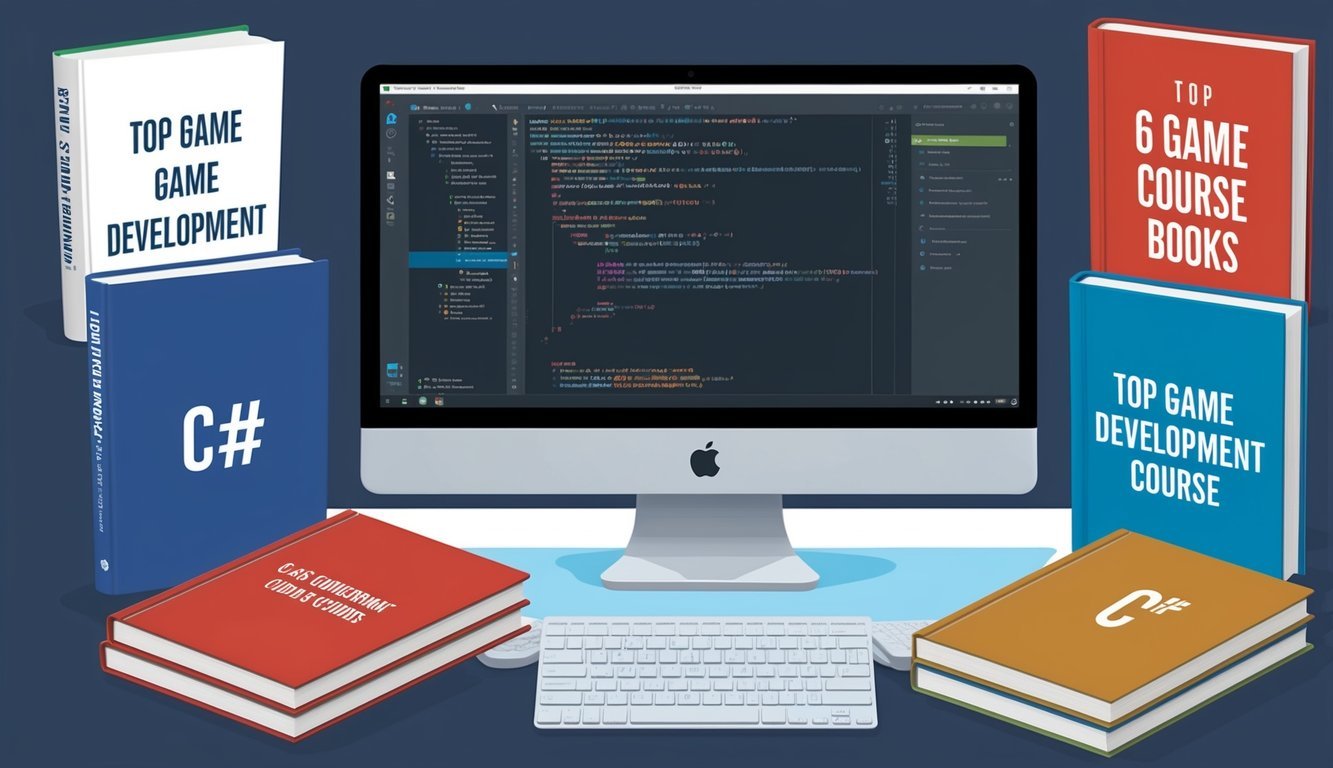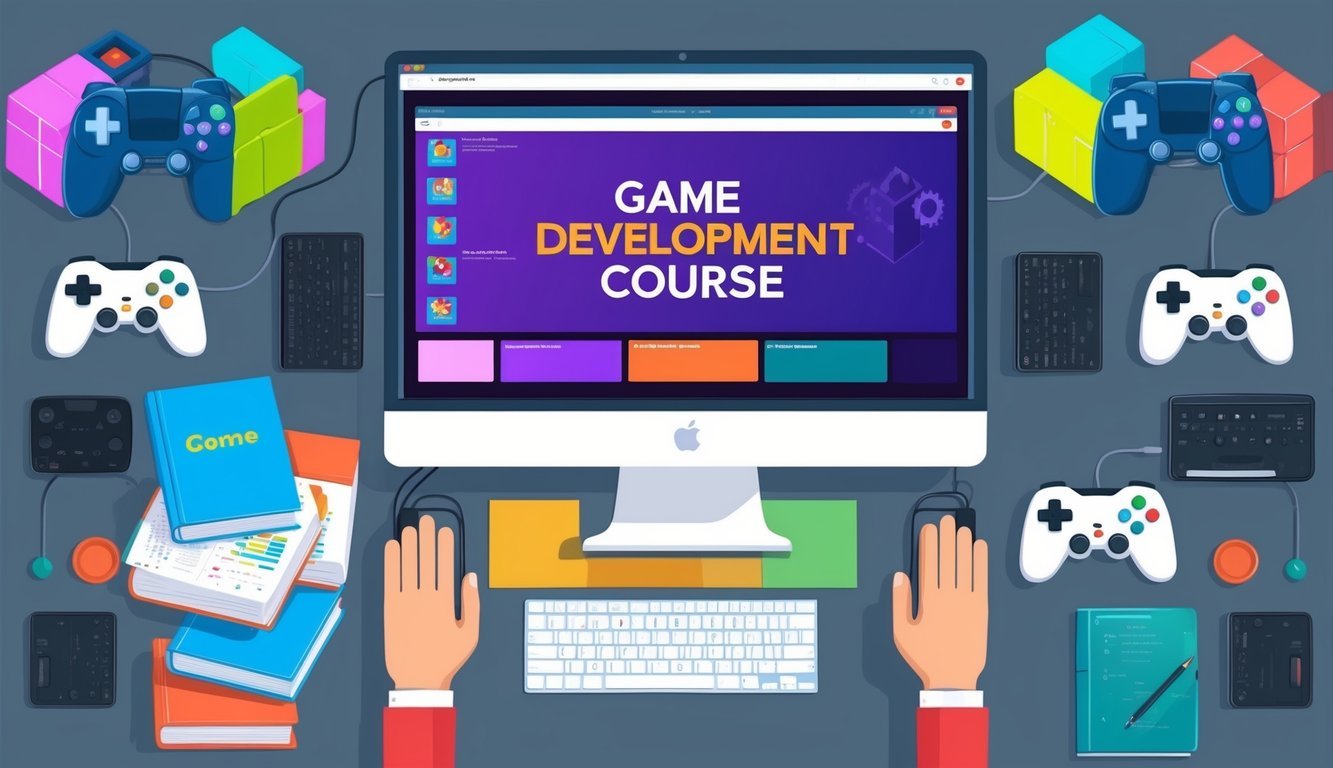Game development is seriously an exciting journey where you can turn your creative ideas into reality.
With the right skills, you could be crafting immersive worlds and gameplay experiences that players will love.
Plus, learning game development opens up tons of career paths in the booming video game industry.
Who wouldn’t want that?
You’ve got a wealth of fantastic online courses at your fingertips to learn game development. These courses cover everything from using popular game engines and coding in C++ to designing game levels and beyond.
Whether you’re just starting or you’ve already dipped your toes in the water, there’s something here to help you boost your skills.
Let’s dive into some of the top game development courses that can kickstart your journey into game creation!
1) Unreal Engine: The Complete Guide
Ready to take the plunge into game development with one of the best engines out there? Unreal Engine 5: The Complete Beginner’s Course could be your ticket to success.
This course kicks off with the basics—no worries if you’re a newbie! You’ll get the hang of setting up your first project and familiarizing yourself with the Unreal Engine interface.
As you journey through the course, you’ll learn to create game worlds, add interactive elements, and bring characters to life, all while tackling collision handling and user interfaces.
By the end, you’ll have your very own game built from the ground up—how cool is that? Plus, you’ll learn how to package it up for others to play.
If you’re itching to dive even deeper, take a look at the Epic Games Game Design Professional Certificate.
It takes a closer look at game development and prototyping.
2) Unity Beginner to Advanced
Eager to master Unity game development? Check out the Unity Beginner to Advanced course on Udemy.
It’s a great fit whether you’re a complete beginner or have some experience under your belt.
You’ll start with the basics and gradually work your way to advanced topics, covering everything from Unity’s UI system to creating complex game mechanics.
No need to panic if you’re totally new to game dev; this course breaks everything down into bite-sized, easy-to-understand pieces.
Before long, you’ll be building your first game!
As you continue, you’ll tackle more challenging projects, which is a great way to really get a feel for Unity’s powerful features.
By the end of the course, you’ll be equipped to create your own video games from scratch, understanding how to apply Unity effectively across different game types.
Keep this in mind: practice makes perfect, so dive in, experiment, and have a blast learning!
3) Game Design and Development Specialization
Thinking about learning game design from scratch? You should check out the Game Design and Development Specialization on Coursera.
It’s a solid choice for beginners and intermediate learners.
This program covers five courses that get you acquainted with all the basics, starting from game design fundamentals to more advanced concepts.
In the first course, you’ll learn about level design, game balancing, and prototyping—essential skills for crafting fun and engaging games.
Next, you’ll dive into 3D game development using Unity, gaining hands-on experience with this popular game engine.
You’ll also create different types of games, including a first-person 3D shooter and a 3D platformer.
The capstone project ties everything together as you design your own game from start to finish.
Once you wrap up this specialization, you’ll not only have a strong foundation in game design and development, but also a snazzy portfolio of games to impress potential employers.
4) C# Programming for Unity Game Development

Want to make amazing games with Unity? You’ve got to learn C#.
It’s the main programming language used in Unity game development.
C# Programming for Unity Game Development is an excellent starting point, especially if you don’t have any coding experience yet.
You’ll pick up C# basics and how to use them effectively in Unity.
This course dives into a bit more than some of the other beginner Unity classes out there, which is great!
If you’re looking for a hands-on approach, check out Unity C# Scripting.
It’ll help you build a strong foundation in both C# and Unity game dev.
Ready to go deeper? Try Unity C# Scripting — Complete C# for Unity Game Development.
This course covers everything from basic scripting to AI development.
You’ll even tackle mobile game integration and version control, which is super helpful for beginners and Unity users looking to level up their C# skills.
5) Introduction to Game Design by CalArts

Want to learn game design from industry professionals? Check out the Introduction to Game Design course offered by CalArts on Coursera.
It’s perfect if you’re eager to jump into the world of game creation.
In this course, you’ll explore what makes a game tick and how different mechanics affect player interaction.
It’s not all theory—you’ll get your hands dirty with assignments where you can put your new skills to the test.
CalArts has a stellar reputation for its arts programs, and this course is no exception.
You’ll be learning from experienced faculty who really know the gaming industry.
The best part? You can take this course at your own pace, making it super flexible for anyone who wants to learn, regardless of their schedule.
So why not start your game design journey today?
6) The Ultimate Guide to C# Unity Programming

Ready to dive deep into game development with Unity? The Ultimate Guide to C# Unity Programming is an awesome choice for beginners wanting to learn C# while creating games.
You’ll kick things off with the basics of C# in a fun, engaging way by making your own game.
This course shows you how to use player input to control game behavior, making learning a blast.
As you progress, you’ll learn how to add different components to game objects and apply gravity and other forces, making your games feel realistic.
One of the coolest parts? You’ll learn how to get game objects to interact with one another, which is key for creating dynamic and exciting gameplay.
By the end, you’ll have a firm grasp of Unity’s core basics, minus all the complexity.
This course is a solid starting point for your game development adventure.
Understanding the Basics of Game Development

Game development kicks off with getting cozy with key programming languages and familiarizing yourself with popular game engines.
These tools are essential for breathing life into your game ideas.
Key Programming Languages
C# and C++ are the powerhouses of game development.
C# is a favorite with Unity, a go-to game engine, mainly ‘cause it’s easier to learn—perfect for beginners! C++, while trickier, packs more performance punch and is often the choice for AAA game development.
If you’re considering mobile games, Java is your buddy.
For rapid prototyping, Python is super beginner-friendly.
Looking at browser games? JavaScript’s got you covered.
Think about what you want to achieve.
Want to make mobile apps? Or are you dreaming about creating big-time console titles? Your goal can guide your learning journey.
Game Engines Overview
Game engines are like your toolbox for building games faster and easier.
Unity is a frontrunner and works great for both 2D and 3D games.
Want to get your feet wet? You can learn Unity basics through online courses, too!
Then there’s Unreal Engine, famous for its stunning graphics—perfect for high-end PC and console games.
Don’t overlook Godot, a free, open-source choice that’s picking up steam.
Each engine has its charm.
Unity shines for mobile and indie games, Unreal is all about realism, and Godot is lightweight and beginner-friendly.
Play around with different engines to find the one that feels right for you.
Most have free versions to help you get started!
Enhancing Your Learning Experience

Taking game development courses is just the tip of the iceberg.
If you really want to level up your skills, you’ll need to roll up your sleeves and connect with other folks in the field.
Practical Tips for Aspiring Developers
Start by carving out a dedicated workspace at home.
It doesn’t have to be fancy—a simple desk in a quiet nook will do.
Just make sure it’s comfy and well-lit.
Familiarize yourself with version control systems like Git.
They’re handy for keeping tabs on your code changes and collaborating better with others.
Practice coding daily, even if it’s just for a half-hour.
Consistency really is key to building up your skills.
Try recreating some simple games that you enjoy.
This hands-on practice will teach you loads about game mechanics and coding challenges.
Keep a development journal to track your progress and jot down ideas.
It’s a straightforward way to see how far you’ve come and spark new game concepts.
Networking in the Game Development Community
Join online forums and communities centered around game development. Reddit’s gamedev community is a fantastic place to start.
Don’t miss out on local game jams or hackathons! These events are prime for meeting others, testing your skills, and having a lot of fun under some pressure.
Follow game developers on social media; Twitter and LinkedIn are overflowing with industry insights and job opportunities.
Consider joining professional organizations like the International Game Developers Association.
They often have mentorship programs and networking events to help you connect.
And hey, don’t be shy about sharing your work online! Post your projects on platforms like itch.io or GitHub.
You never know who might come across them and reach out.
Frequently Asked Questions

Game development courses are diverse and offer plenty of options for everyone.
Some are free, while others offer certificates.
Let’s tackle some common questions about these courses.
What are some recommended game development courses for beginners?
If you’re dipping your toes into game development, definitely check out Unity Beginner to Advanced.
It’s ideal for learning the basics.
Another good option is the Introduction to Game Design by CalArts.
These courses are your best starting points!
Where can I find game development courses that offer certificates?
Many online platforms provide game development courses with certificates.
One popular choice is the Game Design and Development Specialization.
You should also look at C# Programming for Unity Game Development.
These courses give you both skills and proof of completion.
If you’re interested in mastering deployment and automation processes, check out the most comprehensive CI/CD courses available online.
They’re a game changer for streamlining updates and maintaining quality.
Can you suggest any free game development courses online?
Absolutely! You can find a good selection of free game development courses on platforms like Coursera and edX.
Some offer a mix of free and paid material, so keep an eye out for courses that let you audit for free—learn without spending a dime!
Which are the best-rated game development courses available?
Unreal Engine: The Complete Guide is highly praised by students. Unity Beginner to Advanced also gets great feedback.
These courses have solid content and instructors who really know their stuff.
Are there any free online game development courses that also offer certificates?
Yup! Some platforms provide free courses with optional paid certificates.
Often, you can take the course for free and then pay for a certificate later if you want one.
Check out Coursera and edX for those options, and don’t forget they sometimes offer financial aid, too!
What are the essential stages one learns about in game development courses?
Game development courses usually cover planning, design, coding, and testing.
You’ll learn about character creation, level building, and sound integration.
Most courses will get you comfortable with game engines like Unity or Unreal, and they’ll guide you through the process of publishing your game once it’s finished.

